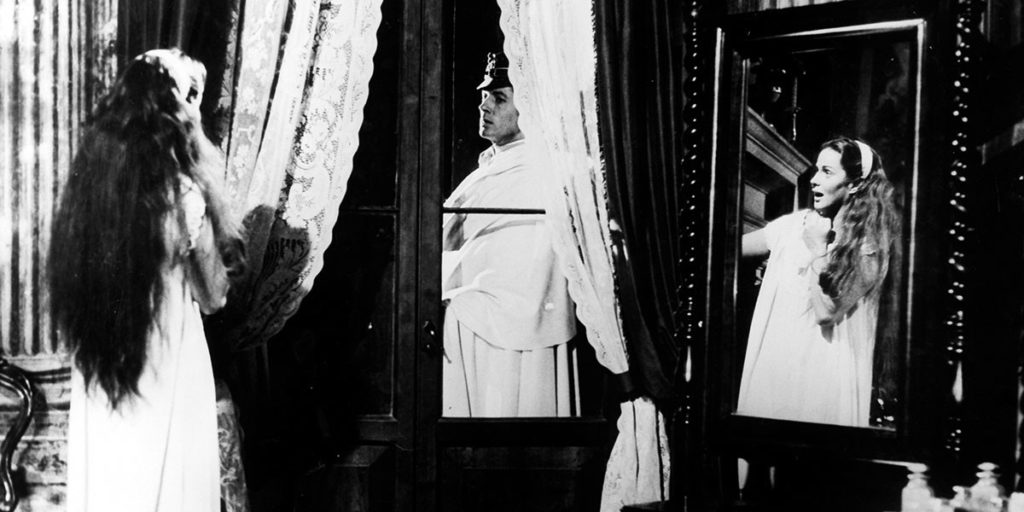
Luchino Visconti’s Senso might be the first moment when the director strayed from Neorealism. But it still has commonalities both within that genre as well as period films. Both genres have protagonists who overextend themselves, and only the real can relate. This unreal person is Livia, the Countess Sarpieri (Alida Valli). She is trying to manipulate an Austrian military officer. He’s Franz Mahler (Farley Granger), who can free her cousin, the Marquis Roberto Ussoni (Massimo Girotti) from exile. Both cousins live in 1860’s Venice, a volatile time in history. Venice was under Austro-Hungarian rule. She believes Venice should join Italy, a move still controversial today. As these things go, her political beliefs become clouded as she keeps hanging with Franz.
As a foray into period pieces, Senso shows Visconti’s visual style. There’s an inherent beauty in watching the women here in full length gowns. It also shows his interests in showing the interior spaces of a time gone by. There’s a texture here that he would hone in The Leopard, using that quality to convey aristocratic decay. If anything, he’s more explicit here. We get to see the rented room that the Countess and Franz have to use. At least The Leopard gives The Prince dignity by making him disappear off creepy alley ways. These are spaces where aristocrats mix with lay people, where the former has celebrity status. But surprisingly, the latter gets power over the aristocrats for once.
The film’s biggest flaw, however, is the Countess. She does things that I would do in my late twenties, which isn’t so far away. Basing this on casting choices, she’s three years older than me. I hope I’m not as dumb when I reach her age. She has her moments of wisdom, like acquiescing to her husband’s wishes. They go to a country retreat instead of staying in war torn Venice where her two loves live. But when Franz sneaks into that estate, she covers up for him. The rest of the movie shows her desperation in a bad kind of melodrama where women are weak. And this is disappointing since that misunderstood genre usually shows cinema’s strongest female characters.
Visconti, like a few directors, likes depicting downfalls. There’s something usually survivalist or pragmatic about those characters. While future characters have smooth cushions while their lives are falling apart. But the only thing smooth about this movie is Franz. He manipulates the Countess into paying for a quack doctor to fake a disability for him. Supposedly this is some kind of revenge. He successfully doing to her what she wanted to do to him during their first encounter. This also takes advantage of Granger’s ability to play some despondent drunk. He does this at the end of every Hitchcock film he made. But this is just sadistic, taking away from any enjoyable quality that movies like this supposedly should have.
Almost. It’s strange that we’re pardoning this sadism because a lot of it does admittedly look good. It also shows the through lines between the genres Visconti worked on. Both the eternal urban chaos that’s omnipresent in Italy both of past and recent present. That country just endured the war and its effects. Visconti saw an audience wanting an escape but he gave them this instead. Instead of officers and gentlewomen, he shows Venice and eventually, Verona, full of soldiers setting fire to the place. The sleek carriage transporting the Countess is dirty and won’t take her to places she wants to go. This is something that deconstructed and shows the flaws of a past that seems like a fantasy.

